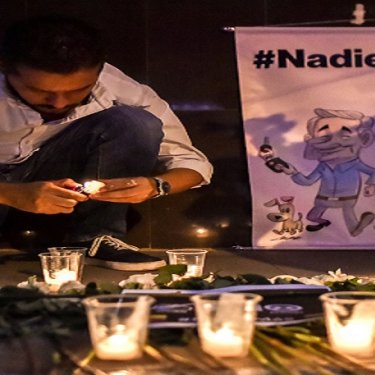Day of the Journalist: Colombia’s journalists need more protection

As Colombia prepares to mark “Day of the Journalist” tomorrow, Reporters Without Borders (RSF) deplores the increasingly dangerous environment for media personnel in this Caribbean and Andean country, where the past month has seen a disturbing surge in threats and two journalists were murdered yesterday.
Yesterday’s victims, local newspaper editor Jairo Alberto Calderón Plazas and local radio host Valentín Rúa Tezada, were slain in separate shooting attacks in the western Cauca Valley.
The threats and deadly violence have come at a time of marked political polarization during the transition from outgoing President Juan Manuel Santos to President-elect Iván Duque, who will take office on 7 August. There has been a surge in attacks and intimidation attempts by the paramilitary armed groups still present in many parts of Colombia, which have stepped up their harassment of human rights defenders, union leaders and journalists regarded as problematic.
Jineth Bedoya, a well-known journalist who is deputy editor of the daily El Tiempo, and journalists with La Silla Vacía, a news website,were among those on a hit-list signed by a far-right paramilitary group called the Bloque Central de Las Águilas Negras that was circulated on 14 July.
María Jimena Duzán, a journalist with the weekly Semana, received exceptionally violent anonymous threats on Twitter the next day: “Ms. Duzán must be raped, spat on, cut up with a chain saw and hanged in Bolívar Square.” Vanessa de la Torre, a presenter on Noticias Caracol and Blu Radio, was threatened with death on Twitter a few days later for writing articles critical of former President Alvaro Uribe.
After covering the murders of union leaders, the staff of RCN Radio have been given special attention, with at least five of its journalists, including editor Yolanda Ruiz, receiving repeated death threats by telephone.
“Amid the current political tension, Colombia’s journalists are playing a vital role and, as guarantors of the democratic debate, it is unacceptable that they should be the victims of this political polarization and become murder targets,” said Emmanuel Colombié, the head of RSF’s Latin America bureau.
“They must be given more protection as a matter of urgency. Colombia’s judicial authorities must identify and punish those responsible for these threats as quickly as possible and must create a special unit to deal with online and social network attacks.”
The many journalists who have been harassed and threatened online include El Tiempo cartoonist Matador, Daniel Samper Ospina of Semana, freelancer and human rights defender Ricardo Ruidíaz, Catalina Vásquez, Jhanuaria Gómez, Laura Montoya, Emiro Goyeneche, Nixon Piaguaje, Giovanny Calcue, Mauricio Rodríguez, Luis Carlos Vélez of La FM and Juan José Hoyo of El Espectador.
Hoyo, who had been covering judicial proceedings against political leaders, returned to his Medellín home last month to find that someone had forced the door and stolen much of his journalistic equipment.
July’s wave of online threats is very worrying, especially as there is no state agency in Colombia that specializes in investigating cyber-harassment and assisting its victims. A report entitled “Online harassment of journalists: the trolls attack,” which RSF published on 26 July, includes detailed recommendations for dealing with attacks of this kind.
Yesterday’s two murders in the Cauca Valley underscored the fact that Colombia’s journalists are exposed to a violent and sometimes extremely dangerous environment, as well as threats.
Calderón, the editor of the local daily Contacto, was gunned down by a man on a motor-cycle in city of Tulúa, while Rúa, the host of the programme “Salvajina Stereo” on Radio 107.7 FM, was killed by a single shot to the head near his home in the town of Suárez. The motive is not as yet clear in either of these two murders.
Two Ecuadorean journalists and their driver were kidnapped and murdered in March by a breakaway faction of Colombia’s FARC rebels in Esmeraldas, a region along the border between Ecuador and Colombia that has been a no-go zone for reporters and information “black hole” for years.
Journalists are also very vulnerable in rural parts of Catatumbo, Arauca, Putumayo, Caquetá and the Cauca Valley, where they are often targeted and have to censor themselves because of organized crime activities, drug trafficking and land conflicts.
RSF calls on President-elect Iván Duque to make defence of the freedom to inform a priority for his administration and to ensure that journalists are both safe and enjoy freedom of movement and access throughout the country.
Inter alia, this will require providing more resources to the agency that is supposed to protect journalists, called the National Protection Unit (UNP), and reinforcing the justice ministry units that are responsible for investigating threats and crimes of violence against the media.
Finally, the incoming administration must also defend the image of journalists in its public statements and promote respect for their work in the course of its peace talks with the two rebel groups still bearing arms, the National Liberation Army (ELN) and People’s Liberation Army (EPL).
Colombia is ranked 130th out of 180 countries in RSF's 2018 World Press Freedom Index.



